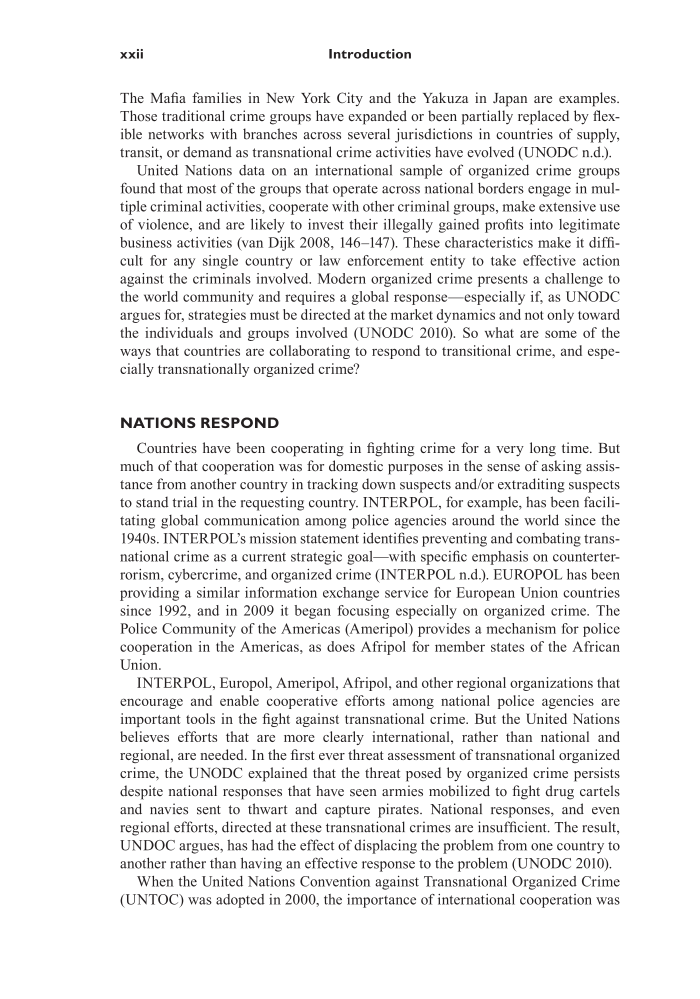xxii Introduction The Mafia families in New York City and the Yakuza in Japan are examples. Those traditional crime groups have expanded or been partially replaced by flex- ible networks with branches across several jurisdictions in countries of supply, transit, or demand as transnational crime activities have evolved (UNODC n.d.). United Nations data on an international sample of organized crime groups found that most of the groups that operate across national borders engage in mul- tiple criminal activities, cooperate with other criminal groups, make extensive use of violence, and are likely to invest their illegally gained profits into legitimate business activities (van Dijk 2008, 146–147). These characteristics make it diffi- cult for any single country or law enforcement entity to take effective action against the criminals involved. Modern organized crime presents a challenge to the world community and requires a global response—especially if, as UNODC argues for, strategies must be directed at the market dynamics and not only toward the individuals and groups involved (UNODC 2010). So what are some of the ways that countries are collaborating to respond to transitional crime, and espe- cially transnationally organized crime? NATIONS RESPOND Countries have been cooperating in fighting crime for a very long time. But much of that cooperation was for domestic purposes in the sense of asking assis- tance from another country in tracking down suspects and/or extraditing suspects to stand trial in the requesting country. INTERPOL, for example, has been facili- tating global communication among police agencies around the world since the 1940s. INTERPOL’s mission statement identifies preventing and combating trans- national crime as a current strategic goal—with specific emphasis on counterter- rorism, cybercrime, and organized crime (INTERPOL n.d.). EUROPOL has been providing a similar information exchange service for European Union countries since 1992, and in 2009 it began focusing especially on organized crime. The Police Community of the Americas (Ameripol) provides a mechanism for police cooperation in the Americas, as does Afripol for member states of the African Union. INTERPOL, Europol, Ameripol, Afripol, and other regional organizations that encourage and enable cooperative efforts among national police agencies are important tools in the fight against transnational crime. But the United Nations believes efforts that are more clearly international, rather than national and regional, are needed. In the first ever threat assessment of transnational organized crime, the UNODC explained that the threat posed by organized crime persists despite national responses that have seen armies mobilized to fight drug cartels and navies sent to thwart and capture pirates. National responses, and even regional efforts, directed at these transnational crimes are insufficient. The result, UNDOC argues, has had the effect of displacing the problem from one country to another rather than having an effective response to the problem (UNODC 2010). When the United Nations Convention against Transnational Organized Crime (UNTOC) was adopted in 2000, the importance of international cooperation was
Document Details My Account Print multiple pages
Print
You have printed 0 times in the last 24 hours.
Your print count will reset on at .
You may print 0 more time(s) before then.
You may print a maximum of 0 pages at a time.




























































































































































































































































































































































































































































































































































































































































































































































































































































































